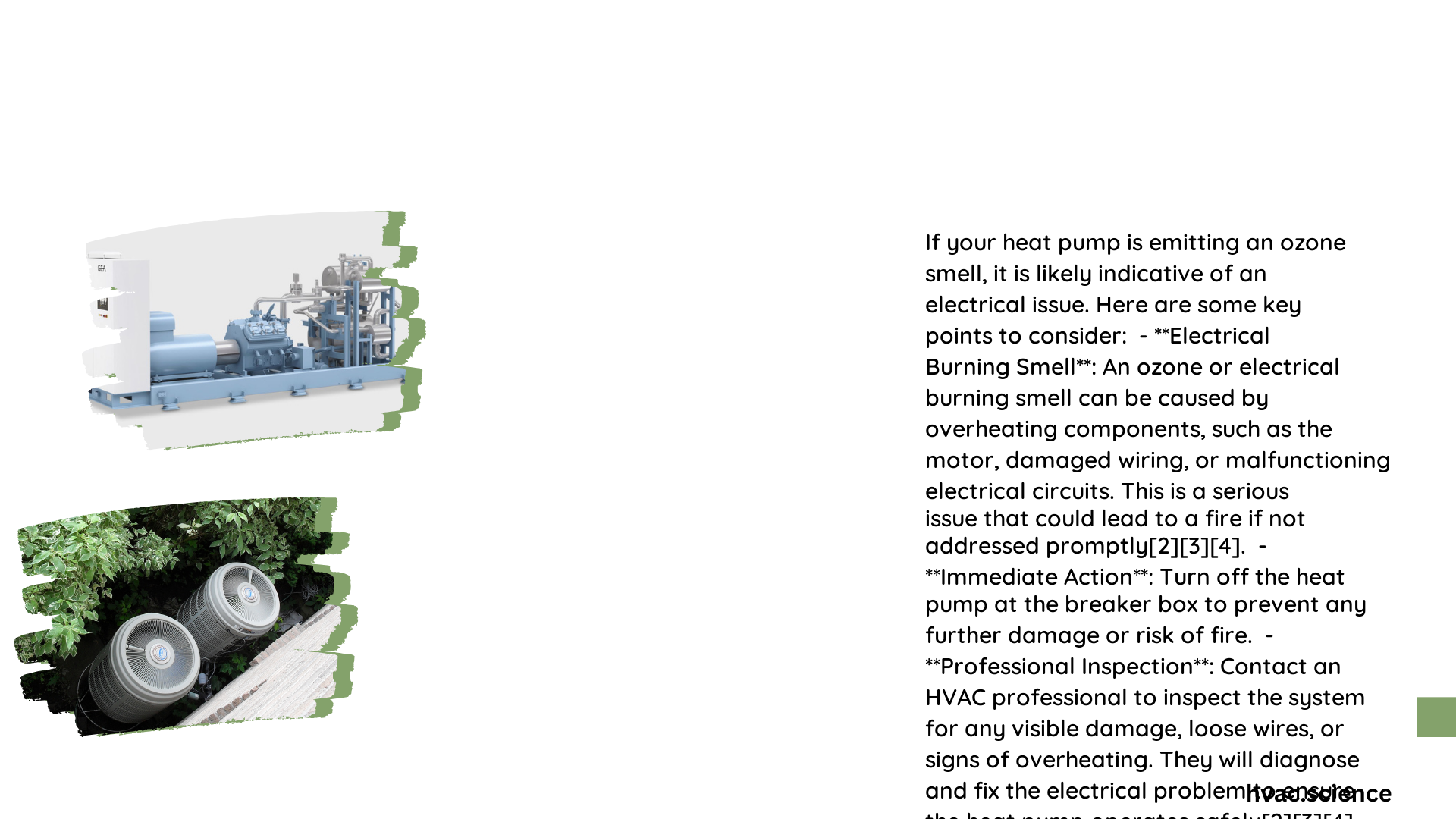Heat pump ozone smell is a concerning issue that can indicate electrical problems within your HVAC system. This odor, often described as sharp and pungent, resembles the scent of chlorine or electrical burning. It’s typically caused by electrical arcing or overheating components in your heat pump. Understanding the causes, health effects, and solutions for this problem is crucial for maintaining a safe and efficient home heating system.
What Causes Heat Pump Ozone Smell?
The ozone smell from a heat pump is usually associated with electrical issues. Here are the primary causes:
- Electrical Arcing: Faulty wiring or damaged electrical components can lead to sparking, which produces ozone.
- Overheating Motors: When motors in the heat pump system overheat, they can emit an ozone-like odor.
- Malfunctioning Capacitors: Failing capacitors can cause electrical discharges, resulting in ozone production.
- Worn Insulation: Deteriorating insulation on electrical wires can lead to short circuits and ozone generation.
Is Heat Pump Ozone Smell Dangerous?

Yes, the ozone smell from a heat pump can be dangerous for several reasons:
- It indicates potential fire hazards due to electrical issues.
- Ozone itself is a respiratory irritant and can cause health problems.
- The smell may be a sign of more serious underlying issues in your HVAC system.
What Are the Health Effects of Heat Pump Ozone Smell?
Exposure to ozone, even in small amounts, can have several health impacts:
- Respiratory Irritation: Coughing, wheezing, and shortness of breath
- Eye and Throat Irritation: Burning or stinging sensations
- Headaches: Prolonged exposure can lead to headaches
- Aggravation of Asthma: Worsening of symptoms for asthma sufferers
- Long-term Effects: Potential lung damage with chronic exposure
How Can I Diagnose Heat Pump Ozone Smell?
To diagnose the source of the ozone smell:
- Turn off the heat pump immediately.
- Locate the source of the smell – is it coming from vents or the outdoor unit?
- Check for visible signs of damage or burning on electrical components.
- Listen for unusual noises when the system is running, which might indicate electrical problems.
- Use a multimeter to test for voltage irregularities if you’re comfortable with electrical work.
What Steps Should I Take to Fix Heat Pump Ozone Smell?
Follow these steps to address the ozone smell:
- Power Down: Turn off the heat pump at the circuit breaker.
- Ventilate: Open windows to clear the air of the ozone smell.
- Inspect: Look for visible damage on accessible parts of the system.
- Clean Filters: Replace or clean air filters, as dirty filters can contribute to overheating.
- Professional Inspection: Contact an HVAC technician for a thorough examination.
Can I Prevent Heat Pump Ozone Smell?
Yes, you can take preventive measures:
- Schedule regular maintenance checks (twice a year)
- Keep air filters clean and replace them as recommended
- Ensure proper ventilation around your heat pump
- Address any unusual noises or performance issues promptly
- Install a surge protector for your HVAC system
What Is the Cost to Repair Heat Pump Ozone Smell Issues?
The cost can vary depending on the underlying cause:
| Repair Type | Estimated Cost Range |
|---|---|
| Electrical wiring repair | $150 – $500 |
| Capacitor replacement | $100 – $250 |
| Motor replacement | $200 – $800 |
| Full system inspection | $75 – $200 |
How Long Does It Take to Fix Heat Pump Ozone Smell Problems?
The time frame for repairs can vary:
- Simple issues like capacitor replacement: 1-2 hours
- Wiring repairs: 2-4 hours
- Motor replacement: 3-6 hours
- Comprehensive system overhaul: Up to a full day
What Are the Long-term Implications of Ignoring Heat Pump Ozone Smell?
Ignoring the ozone smell can lead to:
- Increased risk of electrical fires
- Higher energy bills due to inefficient operation
- Premature failure of heat pump components
- Potential health issues from prolonged ozone exposure
- More expensive repairs if problems escalate
When Should I Call a Professional for Heat Pump Ozone Smell?
Contact an HVAC professional immediately if:
- The ozone smell persists after turning off and on the system
- You notice any signs of burning or melting
- The smell is accompanied by unusual noises or poor performance
- You’re not comfortable performing basic troubleshooting
- The problem recurs after initial fixes
Remember, electrical issues can be dangerous. When in doubt, it’s always safer to consult with a qualified technician rather than attempting complex repairs yourself.
By addressing heat pump ozone smell promptly and properly, you can ensure the safety, efficiency, and longevity of your heating system while protecting your family’s health.
References:
1. HVAC.com – Common Heat Pump Smells
2. Hopkins Air Conditioning – 5 Common Heat Pump Smells Explained
3. Millian Aire – Why Your Heat Pump Smells: Causes & Solutions
